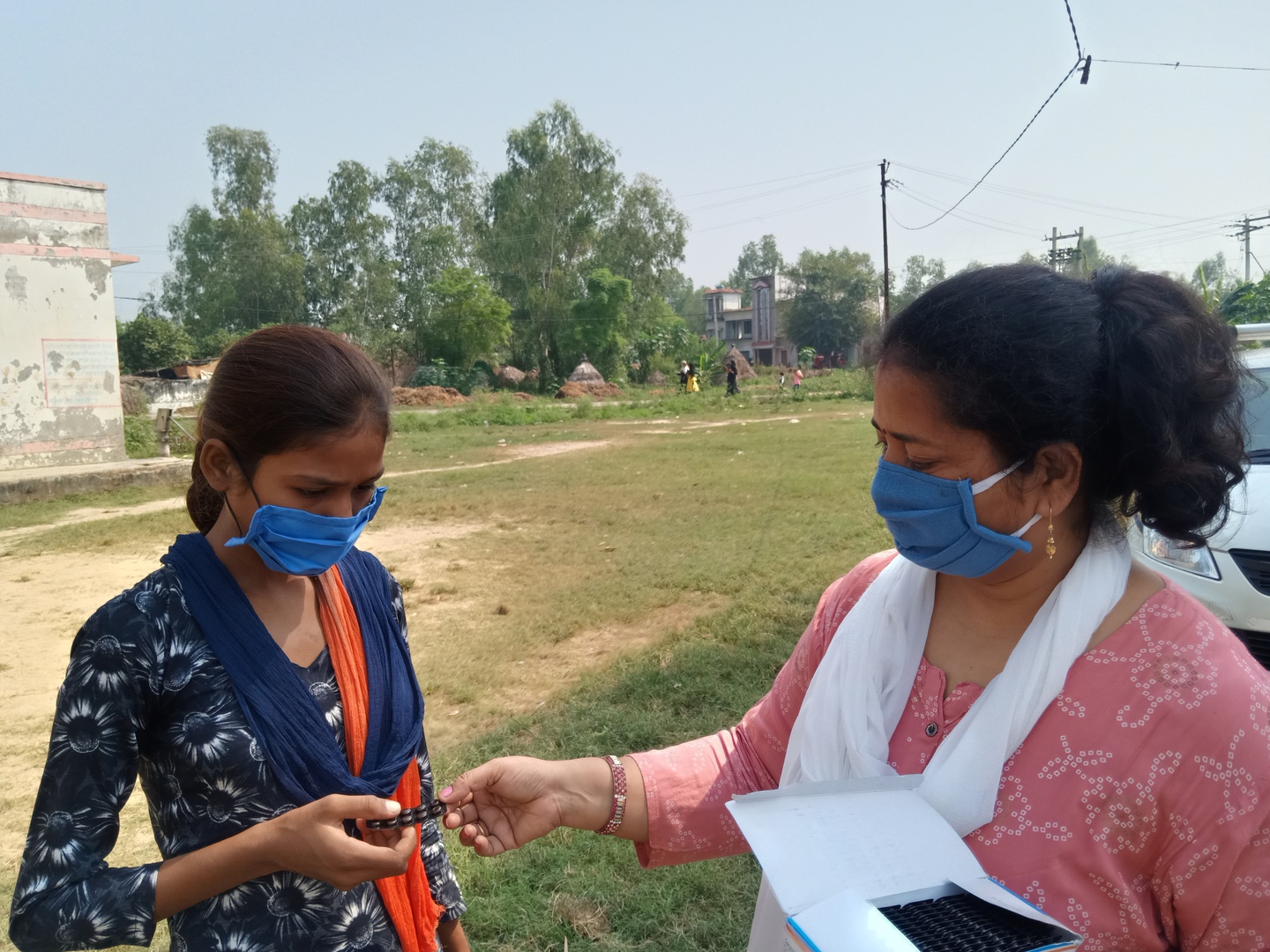Field Stories
In her words: Voices from girls around the world
October 5, 2023
Supporting students in India during COVID-19
A principal in India navigated COVID-19 lockdowns and a digital divide to continue providing her female students with weekly iron and folic acid supplementation.
Posted on September 2, 2021
When India first went into lockdown in March 2020 and schools closed for in-classroom learning, the main distribution mechanism for iron and folic acid (IFA) supplements was cut off for several months. Richa Pathak, principal of the Government Girls Inter College in Rampur Ghogar, Uttar Pradesh, played a critical role in her students’ health and nutrition amidst the unfolding crisis. She bridged the gap between the school delivery system and community distribution to ensure her students were still able to access this important supplement.
Prior to school closures, IFA supplements were distributed weekly to students in Grade 6 to 12 enrolled in public schools throughout India. According to the country’s Comprehensive National Nutrition Survey, 17.5% of adolescent boys and 39.6% of adolescent girls have anaemia. Nutrition International supports the government-run program Anaemia Mukt Bharat (which translates to Anaemia Free India) to prevent anaemia by providing nutrition education, training and resources to educators. Pathak had attended such trainings on anaemia prevention through IFA supplementation and an iron-rich diet. She also previously had a Nutrition International staff member come speak to her students for an interactive and informative session.
“We were motivated through these programs. I applied these instructions and found a great change in the health of students. This success motivated me,” Pathak shared. When schools shut, she didn’t want to lose the momentum and she didn’t want the health of her students to be further jeopardized during a global pandemic.
“I was quite concerned about the girls. It was very important that the IFA tablets reach them. So, the moment I got an opportunity, I decided to go ahead and just do it by whatever means possible.”
As classes moved online, Pathak needed to figure out how to overcome the digital divide while simultaneously working on a plan to provide her students with access to IFA tablets that were being stored at the school. Not all her students had access to smart phones or a computer to be able to connect to the Internet. In addition to figuring out how to provide meaningful classes, she was actively thinking through the possible approaches to deal with the unwanted break in supplementation. She spoke with the school’s helper – who lived in the same village where the inter college was located – about delivering supplements to each student’s home. With the support of a local health worker they set out to visit the adolescent girls door to door. While masked and maintaining COVID-19 protocols, they put in place a delivery mechanism that ensured her students could continue to receive their weekly IFA supplement.
“I was quite concerned about the girls. It was very important that the IFA tablets reach them. So, the moment I got an opportunity, I decided to go ahead and just do it by whatever means possible,” Pathak said. “The chain of supplementation could not be allowed to break even in these unprecedented circumstances.”
Visiting door to door also provided the opportunity to know who had digital access and who did not. Pathak was particularly worried about students from more disadvantaged families and how the lack of connectivity could quickly translate into students dropping out of school.
She identified students in the community who possessed smart phones and made study groups throughout the village, ensuring that each group had a device to attend the online classes. To avoid over crowding, she developed a schedule for group members. Precautions were put in place to reduce the spread of infection amongst and through students. This novel way of teaching excited students, which inspired them to actively participate in their classes. The groups also became another way to streamline delivery of the IFA tablets and impart nutrition education. The peer support helped to encourage consumption of the tablets outside of the physical classroom setting. Instead of going to individual households, Pathak was able to regularly visit each group, supplying the tablets as well as reassuring her students to stay motivated despite the extreme challenges COVID brought.
“Richa was very self-motivated. She was very concerned about the health and nutrition of adolescents, and she went the extra mile,” said Dr. Ameet Babre, Nutrition International’s National Program Manager in India. “When the schools closed down, getting the whole program shifted from the schools to the community level took about two to three months. Richa played an integral role during these interim months.”

By August 2020, adolescents were able to access IFA supplements through community-level delivery systems, such as the local health centre, frontline health workers going door to door and through designated health and nutrition days. Nutrition International worked with state partners to help with the logistics and planning to transfer school-based IFA supplementation to community outreach.
As COVID continues to create an unpredictable climate, and throughout devastating waves of infections in India, Pathak has remained steadfast in her commitment to provide her students with the nutrition they need at a time when a strong immune system is paramount for good health. As schools reopen, some parents and students are hesitant to go back to an in-person learning environment, Dr. Babre explained. Nutrition International is advocating with state governments to encourage continuing community distribution to ensure adolescents remain able to receive IFA supplementation regardless of whether they are attending classes online or in-person.
If Pathak is unable to visit a study group, one of her colleagues goes in her place, along with a community health worker. The collective ownership to continue delivering weekly IFA supplements during the pandemic is an indication of the long-term sustainability of the program and a testament to what’s possible with innovative thinking and collaboration.